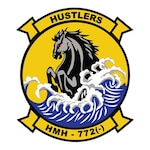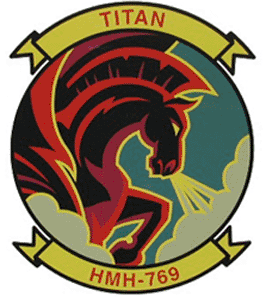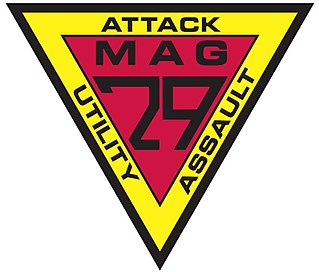
The Sikorsky CH-53E Super Stallion is a heavy lift helicopter operated by the United States military. As the Sikorsky S-80, it was developed from the CH-53 Sea Stallion, mainly by adding a third engine, adding a seventh blade to the main rotor, and canting the tail rotor 20°. It was built by Sikorsky Aircraft for the United States Marine Corps. Developed in the 1970s, it entered service in 1981, and is planned to be in service into the 2030s. It is one of the largest military helicopters in service, and is operated from U.S. Navy ships or from land.

The CH-53 Sea Stallion is an American family of heavy-lift transport helicopters designed and built by the American manufacturer Sikorsky Aircraft. The Sea Stallion was originally developed in response to a request from the United States Navy's Bureau of Naval Weapons made in March 1962 for a replacement for the Sikorsky CH-37 Mojave helicopters flown by the United States Marine Corps (USMC).

Marine Helicopter Training Squadron 301 (HMT-301), was a United States Marine Corps helicopter training squadron stationed at Marine Corps Base Hawaii. Known as the Windwalkers, HMT-301 was part of Marine Aircraft Group 24 (MAG-24) and 1st Marine Aircraft Wing.

A naval aviator is a commissioned officer or warrant officer qualified as a crewed aircraft pilot in the United States Navy or United States Marine Corps. United States Coast Guard crewed aircraft pilots are officially designated as "Coast Guard aviators", although they complete the same undergraduate flight training as Navy and Marine Corps crewed aircraft pilots, and are awarded the same aviation breast insignia.

Marine Heavy Helicopter Squadron 772 (HMH-772) is a United States Marine Corps helicopter squadron consisting of CH-53E Super Stallion transport helicopters. The squadron, known as the Flying Armadillos with the Radio Callsign "Hustler", is based at McGuire AFB, New Jersey and falls under the command of Marine Aircraft Group 49 (MAG-49) and the 4th Marine Aircraft Wing.

Marine Heavy Helicopter Squadron 769 (HMH-769) was a United States Marine Corps CH-53E helicopter squadron. Nicknamed "Titan", the squadron was based at Edwards Air Force Base in California and fell under the command of Marine Aircraft Group 46 (MAG-46) and the 4th Marine Aircraft Wing. HMH-769 was deactivated on 2 August 2008.

Marine Heavy Helicopter Squadron 464 (HMH-464) is a United States Marine Corps helicopter squadron consisting of CH-53E Super Stallion transport helicopters. The squadron is known as the "Condors" and is based at Marine Corps Air Station New River in North Carolina. They fall under the command of Marine Aircraft Group 29 (MAG-29) and the 2nd Marine Aircraft Wing.

Marine Heavy Helicopter Squadron 361 (HMH-361) is a United States Marine Corps helicopter squadron consisting of CH-53E Super Stallion transport helicopters. The squadron, known as the "Flying Tigers", is based at Marine Corps Air Station Miramar in California, and falls under the command of Marine Aircraft Group 16 (MAG-16) and the 3rd Marine Aircraft Wing.

Marine Heavy Helicopter Squadron 462 (HMH-462) is a United States Marine Corps helicopter squadron operating CH-53E Super Stallion heavy transport helicopters. The squadron, known as the "Heavy Haulers", is based at Marine Corps Air Station Miramar in California and falls under the command of Marine Aircraft Group 16 (MAG-16) and the 3rd Marine Aircraft Wing.

Marine Aircraft Group 29 (MAG-29) is a United States Marine Corps aviation unit based at Marine Corps Air Station New River, North Carolina. The group is currently composed of four CH-53E Super Stallion squadrons including the Fleet Replacement Squadron, two Light Attack Helicopter Squadrons flying AH-1Z Vipers and UH-1Y Venoms, and a maintenance and logistics squadron.

Marine Heavy Helicopter Squadron 465 (HMH-465) is a United States Marine Corps helicopter squadron consisting of CH-53E Super Stallion transport helicopters. The squadron, known as "Warhorse", is based at Marine Corps Air Station Miramar in California and falls under the command of Marine Aircraft Group 16 (MAG-16) and the 3rd Marine Aircraft Wing.

Marine Heavy Helicopter Squadron 461 (HMH-461) is a United States Marine Corps helicopter squadron consisting of CH-53K King Stallion transport helicopters. The squadron, known as "Ironhorse", is based at Marine Corps Air Station New River in North Carolina and falls under the command of Marine Aircraft Group 29 (MAG-29) and the 2nd Marine Aircraft Wing. With its lineage starting in 1944, HMH-461 is the oldest active Heavy Lift Helicopter Squadron in the Marine Corps.

Marine Heavy Helicopter Squadron 466 (HMH-466) is a United States Marine Corps helicopter squadron consisting of CH-53E Super Stallion transport helicopters. The squadron, known as the "Wolfpack", is based at Marine Corps Air Station Miramar, California and falls under the command of Marine Aircraft Group 16 (MAG-16) and the 3rd Marine Aircraft Wing.

Marine Heavy Helicopter Squadron 463 (HMH-463) was a United States Marine Corps helicopter squadron consisting of CH-53E Super Stallion transport helicopters. The squadron, also known as "Pegasus", was last based at Marine Corps Air Station Kaneohe Bay in Hawaii and fell under the command of Marine Aircraft Group 24 (MAG-24) and the 1st Marine Aircraft Wing. HMH-463 was decommissioned in April 2022 as part of the Commandant of the Marine Corps Force Design 2030 initiative.

Marine Light Attack Helicopter Training Squadron 303 (HMLAT-303), is a United States Marine Corps helicopter training squadron stationed at Marine Corps Air Station Camp Pendleton, California. Known as "Atlas", HMLAT-303 trains newly commissioned Naval Aviators, conversion pilots, and refresher pilots to fly the Bell UH-1Y Venom and Bell AH-1Z Viper. HMLAT-303 is also responsible for training Bell UH-1Y Venom crew chiefs. It is part of Marine Aircraft Group 39 (MAG-39) and the 3rd Marine Aircraft Wing.

Marine Medium Tiltrotor Training Squadron 204 (VMMT-204) is the MV-22 Osprey training squadron of the United States Marine Corps. Known as the "Raptors", the squadron was originally designated Marine Medium Helicopter Training Squadron 204 (HMT-204) to train new MV-22 pilots and was officially redesignated as VMMT-204 on 10 June 1999. They fall under the command of Marine Aircraft Group 26 (MAG-26) and the 2nd Marine Aircraft Wing.

Airborne Mine Countermeasures Weapon Systems Training School (AWSTS) was a United States Navy helicopter training squadron stationed at Naval Station Norfolk, Virginia. AWSTS trained newly commissioned Naval Aviators, conversion pilots, refresher pilots, and enlisted aircrew on the MH-53E Sea Dragon and was a part of Helicopter Sea Combat Wing, Atlantic Fleet (HELSEACOMBATWINGLANT).

Helicopter Combat Support Squadron FOUR (HC-4) was a United States Navy helicopter squadron based at Naval Air Station Norfolk, Virginia. Nicknamed the "Black Stallions", they flew the Sikorsky CH-53E Super Stallion and MH-53E Sea Dragon helicopters.

Helicopter Mine Countermeasures Squadron 14 (HM-14) was a United States Navy helicopter squadron established in 1978 based at Naval Station Norfolk, Virginia. Nicknamed the Vanguard and flying the MH-53E Sea Dragon, it comprised both active duty and reserve personnel. It was the sister squadron to HM-15, the Blackhawks, based at NS Norfolk.





















